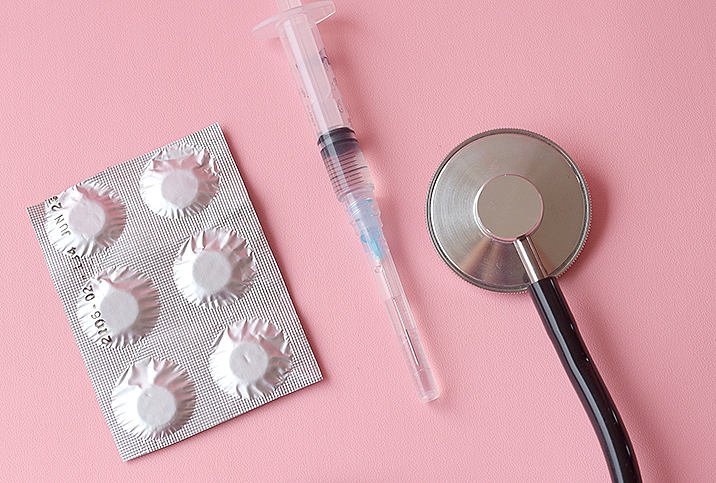Your Guide to Menopause

Most of us have a general understanding that menopause is what happens when a woman's body stops producing eggs and having periods. However, the process of going through menopause can take many women by surprise. The stages of menopause can last for up to a decade, sometimes bringing with them dramatic hormonal changes that can lead to a wide variety of side effects.
By understanding what happens in the body during menopause, women can begin to have a little more agency over their bodies as these side effects appear. We spoke to Mahmud Kara, M.D., founder and CEO of KaraMD, a supplements manufacturer in Cleveland, to find out more about the science behind menopause.
What is menopause and what should you expect?
Menopause describes the process a woman's body goes through when it reaches the end of its reproductive years.
"Menopause is defined as 12 months after a woman's last period," Kara explained. "Menopause is a natural part of the aging cycle. During younger years, the body is prepared for reproduction, but as women get older, the reproductive cycle starts to wind down and, ultimately, prepares to stop."
While menopause is a normal, healthy process, it can take a toll on the body.
"Notably, the changes that occur during the time leading up to a woman's final period, commonly referred to as the 'menopause transition' or 'perimenopause,' as well as the years following a woman's final period can have a significant impact on their overall health," Kara said.
Every woman experiences menopause differently, but for most, it begins between the ages of 45 and 55. The menopause transition can last for seven to 10 years.
"The specifics of menopause and the presence or absence of symptoms will depend heavily on the individual as well as certain factors such as lifestyle choices, genetics, age and so on," Kara said.
The typical stages of menopause
For most women, periods don't stop suddenly. Instead, the body's reproductive system winds down.
"As the body's reproductive system starts to slow down and prepares to stop, certain hormones are no longer produced or are produced at much lower levels, the ovaries no longer release eggs into the fallopian tubes and your menstrual cycle slows then stops," Kara said.
Let's take a look at the typical menopause stages.
Perimenopause
The first stage of menopause occurs when the reproductive cycle begins to slow down. This can occur up to 10 years before menopause, when the reproductive cycle stops completely. During the perimenopausal phase, estrogen and progesterone levels begin to drop. Menstrual cycles can become less frequent and you may begin to notice other symptoms, such as hot flashes, mood changes and changes in your sexual function and libido.
Menopause
Menopause is marked by the final period and is diagnosed after you've had no periods for 12 months in a row.
Postmenopause
Postmenopause refers to the time frame of one year after your final period. During this phase, many women find the symptoms of menopause begin to ease off as the body adjusts to low estrogen levels. However, after menopause, there is an increased risk of some health problems related to the bones and heart.
Signs of perimenopause
Menopause happens slowly in a series of stages, so it isn't always easy to spot, especially in the initial stage of perimenopause.
Here are a few common early signs that your body's hormones are changing in preparation to slow down reproductivity:
- Changes in period regularity, duration, flow, etc.
- Hot flashes
- Trouble sleeping
- Loss of bladder control
- Uncomfortable sexual intercourse
- Vaginal dryness
- Low libido
- Mood irregularities or changes
- Body fat gain or trouble losing weight
- Stiff joints or achy muscles
- Trouble focusing or brain fog
Managing menopause
While most women experience a variety of symptoms and side effects throughout perimenopause and menopause, there are some ways to potentially reduce the severity of these symptoms.
"Making changes to what I like to call modifiable risk factors—risk factors within your control—is often the best place to start," Kara said.
Eating a healthy, balanced diet
"Make sure to include foods that are high in calcium—helps with bone strength—iron, healthy fats, vitamins and minerals, and other nutrients in your diet," Kara suggested. "Avoid foods like refined carbohydrates, processed foods, high-fat items, artificial sweeteners and other foods that can make menopausal symptoms worse."
Exercising regularly
"Staying physically active during menopause is essential to keep bones strong, maintain a healthy weight, boost energy levels and decrease the risk for certain diseases, like heart disease," Kara said.
Try to avoid or cut down on certain lifestyle habits like smoking or frequent alcohol consumption.
Improving sleep habits
"Although menopause can interfere with quality sleep, making sure that you are getting enough sleep each night can help when it comes to hormone regulation as well as other menopausal symptoms," Kara said.
Reducing stress
"With our 'always on' lifestyles, it can be hard to avoid stress," Kara said. "However, chronic stress can interfere with hormone production and elevate levels of other hormones, like cortisol, that over time may aggravate menopause symptoms like weight gain or fatigue."
Hormone replacement therapy (HRT)
A depletion of hormone levels is the root cause of most menopausal symptoms. Hormone replacement therapy (HRT) for menopause often includes medications focused on the predominantly female hormones of estrogen and progesterone.
"Research supports the use of hormone replacement therapy during the menopause process for easing a variety of symptoms," Kara said. "Furthermore, hormone replacement therapy can be an effective treatment intervention when it comes to reducing other risks associated with the menopause process, such as the development of osteoporosis."
Summing up
Menopause is a normal process that occurs in every person with periods at some point in life. It occurs when the reproductive system slows down and eventually stops producing and releasing eggs.
Although menopause and perimenopause can last for many years and lead to some frustrating symptoms, by making a few lifestyle changes, menopause is usually manageable.
Speak to your doctor if you think you are beginning perimenopause or your symptoms are becoming more difficult to manage.


















